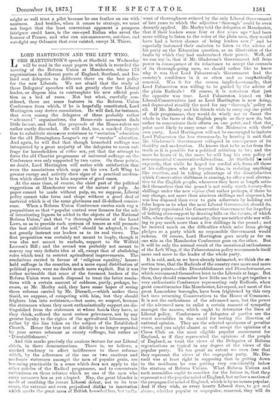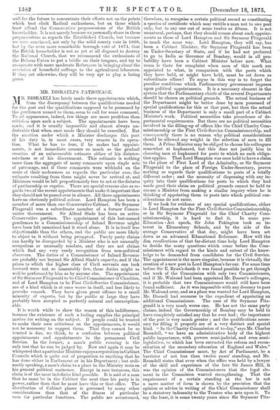LORD HARTINGTON AND THE LEFT WING.
TORD HARTINGTON'S speech at Sheffield on Wednesday 1 will be read in the same papers in which is recorded the meeting of the Reform Union at Manchester, whose 173 organisations in different parts of England, Scotland, and Ire- land sent delegates to deliberate there on the best policy for the new Liberals. We are afraid that the study of these Delegates' speeches will not greatly cheer the Liberal leader, or dispose him to contemplate his new official posi- tion as a bed of roses. Not but what, carefully con- sidered, there are some features in the Reform Union Conference from which, if he is hopefully constituted, Lord Hartington may derive consolation. He will find, for instance, that even among the delegates of these probably rather "advanced" organisations, the Home-rule movement finds little favour, and that the proposals of the Home-rulers are rather curtly discarded. He will find, too, a marked disposi- tion to substitute strenuous resistance to "sectarian" education for the old Birmingham League's cry of "secular" education. And again, he will find that though household suffrage was interpreted by a great majority of the delegates to mean suf- frage for householders of either sex, yet that the attempt to force the old Chartist programme of universal suffrage on the Conference was only supported by two votes. On these points, no doubt, Lord Hartington will notice with satisfaction that even the associations which urge on his own Left Wing to greater energy and activity show signs of a practical modera- tion which should be to him auguries of good omen.
At the same time, of course, the chief part of the political suggestions at Manchester were of the nature of pulp. As paper cannot be made without pulp, so, we suppose, Liberal policy cannot take form and shape without a good deal of material which is of the same glutinous and ill-defined consist- ence. When a Reform Union Conference carries such vag u propositions as that " popular control over licences for the sale of intoxicating liquors be added to the objects of the National Reform Union," and that " a thorough revision of the Land Laws, so as to provide such systems of tenure as will promote the best cultivation of the soil," should be adopted, it does not greatly instruct our leaders as to its real views. The first proposition was certainly not meant to imply, though it was also not meant to exclude, support to Sir Wilfrid Lawson's Bill ; and the second was probably not meant to convey any very definite idea at all, except that of abolishing rules which tend to restrict agricultural improvements. The resolutions carried in favour of ' religious equality,' house- hold suffrage in the counties, and a more equal distribution of political power, were no doubt much more explicit. But it was rather noticeable that some of the foremost leaders of the Reform Union were much disposed to treat the latter resolu- tions with a certain amount of coldness, partly, perhaps, be- cause, as Mr. Morley said, they have some hopes of seeing these reforms carried by Mr. Disraeli,—which makes them timid, we suppose, of competing with him, lest they should frighten him into resistance,—but more, we suspect, because the statesmen whom they most enthusiastically support are dis- tinguished from the statesmen at whose hands they have, as they think, suffered the most serious grievances, not by any greater loyalty to the rights of the agricultural labourers, but rather by the line taken on the subject of the Established Church. Hence the true test of fidelity is no longer regarded by your severe reformer as county suffrage, but rather as Disestablishment.'
And this marks precisely the anxious feature for our Liberal chiefs, in these demonstrations. There is, we believe, a marked tendency to affect indifference to those reforms which, by the adherence of the one or two cautious and moderate statesmen amongst the men of popular grain, are becoming practicable in a sense which does not apply to the other articles of the Radical programme, and to concentrate enthusiasm on those reforms which no one of the men who carry measures has as yet adopted. Nay, the great blunder is made of ascribing the recent Liberal defeat, not to its true cause, the extreme and even prejudiced dislike to innovation which marks the great mass of British householders; but to the want of thoroughness evinced by the only Liberal Government of late years to which the adjective thorough' could be even decently applied. Mr. Morley told the delegates at Manchester, that if their leaders some four or five years ago " had been more willing to listen to the voice of the plain men, they would have had a better chance of being leaders now ;" and he especially instanced their omission to listen to the advice of his party on the Education question, as an illustration of the faults by which they had undermined their power. Well, all we can say is, that if Mr. Gladstone's Government fell from power in consequence of its reluctance to accept the counsels of its thorough-going men, we should rather like to know why it was that Lord Palmerston's Government had the country's confidence in it so often and so emphatically renewed. Was it for the reason implied,—namely, that Lord Palmerston was willing to be guided by the advice of the plain Radicals ? Of course, it is notorious that just the opposite was true. Lord Palmerston leaned on the Liberal-Conservatives just as Lord Hartington is now doing, and deprecated steadily the need for any ' thorough' policy at all. If Mr. Morley and his friends wish to carry any one point of their programme, they would do wisely not to flaunt the whole in the faces of the English people as they now do, but rather to concentrate their efforts on one point. and that the. point most likely to carry some of the Moderates with their own party. Lord Hartington will not be encouraged to imitate Lord Palmerston the less strenuously, by hearing it said that Mr. Gladstone's Government collapsed in consequence of its timidity and moderation. He knows that to be as far from the truth as it is possible for a political criticism to be ; and the more he hears of it, the more he will hug his own policy of non-committal Conservative-Liberalism. At Sheffield he said expressly, that while he hoped for cordial aid, from all those of his colleagues who go beyond him, in resisting anything like reaction, and in taking advantage of the dissatisfaction which Conservative shiftiness is causing, to offer a real alterna- tive to the English people, whenever they have at length satis- fied themselves that the pound is not really worth twenty-five shillings under the new regime (but rather perhaps, if there be any change, not more than nineteen shillings and sixpence), he was less disposed than ever to gain adherents by holding out false hopes as to what the next Liberal Government should do. He justly reprobated the Conservative Government for its policy of bribing class-support by drawing bills on the future, of which bills, when they come to maturity, they are neither able nor will- ing to pay much more than a few shillings in the pound ; and he insisted much on the difficulties which arise from giving pledges as a party which no responsible Government would redeem. Of course, Lord Hartington goes nearly as far on one side as the Manchester Conference goes on the other. But it will be only the normal result of the unnational enthusiasms of the Left Wing, if the Palmerstonian policy recommends itself more and more to the leader of the whole party.
It is said, and, as we have already intimated, we think the as- sertion true, that the Radicals of the country care more and more for those points,—like Disestablishment and Disendowment,— which recommend themselves least to the Liberals at large. But then, they should remember how little use it is to get together a very enthusiastic Conference representing only Radicals, when great constituencies like Manchester, Liverpool, and most of the great Lancashire boroughs, have been frightened by this very fact into returning Conservatives to the House of Commons. It is not the enthusiasm of the advanced men, but the power of the advanced men to enlist a certain amount of sympathy amongst the masses, which ought to determine the lines of Liberal policy. Conferences of delegates of parties are the worst assemblies in the world for testing the direction of national opinion. They are the selected specimens of peculiar views, and you might almost as well accept the opinions of a Chess Club on the most eligible popular amusement for England, as if they represented the opinions of the people of England, as treat the views of the Delegates of Reform organisations as typical in any degree of the views of the popular party. To too great an extent we even fear that they represent the views of the unpopular party. Mr. Dis- raeli was at least right in supposing that in getting down to the residuum he was getting very considerably below the stratum of Reform Unions. What Reform Unions and such assemblies ought to consider for the future is, that they represent not the popular mind of England, but rather a section of the propagandist mind of England, which is by no means popular. And if they wish, as every hearty Liberal does, to get real abuses, whether popular or unpopular, removed, they will do well for the future to concentrate their efforts not on the points which best elicit Radical enthusiasm, but on those which least offend the Conservative prepossessions of the British householder. It is not merely because we personally share in these prepossessions as regards the Established Church, but because we were convinced, not only by the solid county vote in 1868, but by the even more remarkable borough vote of 1874, that the British householder is not as yet at all disposed to destroy the National Church, that we recommend the enthusiasts of the Reform Union to put a bridle on their tongues, and try to co-operate with more moderate Reformers in bringing about the extension of household suffrage to the agricultural labourers. If they act otherwise, they will be very apt to play a losing game.







































 Previous page
Previous page